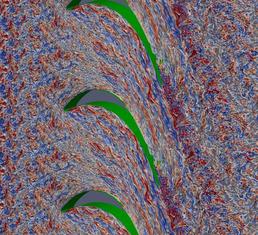Seminar 3rd November 2014 1 p.m. 177
Is high-performance computing the salvation of turbulence research?
Prof Richard Sandberg and Dr Ati Sharma
University of Southampton
- Categories
- NGCM
- Submitter
- Susanne Ufermann Fangohr
Summary
Turbulence is the unsteady, three-dimensional and apparent random motion of fluids, responsible for the majority of mixing and heat transfer and increases of drag and aerodynamic noise generation. Despite its crucial importance in many applications, the complex nature of turbulence makes its accurate prediction extremely challenging. This is primarily due to the fact that turbulent flows are characterized by the presence of a large range of length and time scales of the eddying motions and their multi-scale interactions. In direct numerical simulations, based on first principles, all these scales need to be resolved, incurring enormous computational costs for practical applications. However, dramatic advances in available computing power over the last decades have enabled the use of high-fidelity flow simulation approaches for investigation of turbulent flows and the noise they generate. Such high-resolution simulations generate vast amounts of data, presenting new challenges in analysis and interpretation. Ideas from outside fluid mechanics are beginning to influence how we process, understand and economically represent such data. This is revealing new insights into the physics of turbulence and is driving new ideas in model reduction for turbulence and other multi-scale non-linear systems. In this seminar, we will present the challenges associated with simulating turbulence and how current HPC systems enable us to tackle problems with engineering relevance. We will also discuss how the important physics can be modelled and extracted from large data sets produced on supercomputers.
Biography
Richard D Sandberg received his PhD at the University of Arizona in 2004 and is now Professor of Fluid Dynamics and Aeroacoustics in the Aerodynamics and Flight Mechanics Research Group at the University of Southampton. He has extensive experience in conducting large-scale flow and noise simulations, in particular direct numerical simulations (DNS). His main research interests are turbulent flow, laminar-turbulent transition, aeroacoustics and high-performance computing for CFD. Richard leads the UK Turbulence Consortium (UKTC).
Ati Sharma is Associate Professor in the Aerodynamics and Flight Mechanics Research Group at the University of Southampton. After completing his PhD in the modelling and control of tokamaks at Imperial College, London in 2002, Ati also worked in finance, held a fellowship at Imperial and was a lecturer at the University of Sheffield. His primary research interest is the modelling and control of fluids, especially turbulent.
